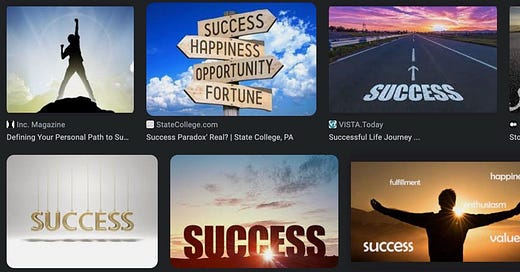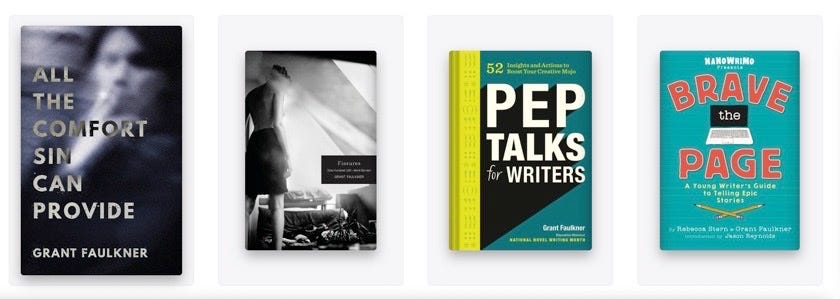I did a search on “success” in Google Images and the images above appeared. Is this what success looks like to you?
The question of what success is might be the most important question you can ask yourself as a writer and as a person.
We live in a culture obsessed with success in so many forms whether it’s money, status, or beauty. Is success getting a book published, becoming a best-selling author, hanging out with other best-selling authors, and being invited to speak at fancy conferences? Adulation from friends and family? Thousands of social media followers? Or the money that comes from a best-selling book and all of the spa treatments and clothes you can buy as a result?
All of that is great, why not? But are those the reasons you picked up a pen the first time to write? After a good writing session, are such things the payoff that make it all worth it?
I believe that living in reverence of our imaginations is the way to preserve the essence of our being. Our art provides our spirit with a plenitude that can’t be found in any other way. Even though we know that whatever we write will never be quite as ideal as the words we’ve imagined, the effort of trying to capture what it is to be sentient weaves its way into every breath of our lives.
We want to feel heard, we want to touch others, and we want to make something remarkable. Seizing our creativity for its own sake brings an immediacy, a resplendency, an urgency of our own possibility.
Our potency is defined by our ability to hear a story’s cries
I know a writer who frequently compares her book sales to another. She monitors other people’s Twitter followers. She gets upset when others are invited to a conference and she’s not. We all have egos, of course. We all want to be loved. But when I hear her talk, I sometimes wonder why she writes. She has an agent, an editor, a book deal, but I wonder if somewhere along the way she lost track of the gift of it all—the gift she has to write a story, the gift she can give others through her story.
“It is the talent which is not in use that is lost or atrophies, and to bestow one of our creations is the surest way to invoke the next,” writes Lewis Hyde in The Gift.
Hyde cites the story of Hermes, who invented the first musical instrument, the lyre, and gave it his brother, Apollo, who then was inspired to invent the pipes. One creation spawns another. Being an artist goes beyond the work of art you create. It will flow into your life and influence how you treat people, the way you love, the way you taste food, the way you stare up at the sky, the way you vote, the way you drive, the way you wash your dishes. Seriously.
Still, is writing a novel useful, many a person has asked? Does writing, creativity, have a practical end?
I wonder if the best things in the world have been achieved in disregard of a notion of usefulness. When people have set out to climb mountains, sail across seas, or fly a plane around the world, I think curiosity drove them as much as gaining anything of measurable value. To be moved by the compulsion to make and explore, to move just for the pure restless sake of moving, without tallying up any costs of consequences, so often leads somewhere.
How to decide what the standards of utility should be when it comes to creative pursuits?
The arts are increasingly seen as dispensable luxuries, but if we narrow the openings for our curiosity by arguing that it’s impractical, financially unrewarding, risky, then the motivation to engage in creative behavior is easily extinguished. The conventional notions of success can dim the voltage of our ideas, water down the fragrant broth of our thoughts. When an impulse of curiosity strikes, it’s best to follow it with a passion that moves forward in disregard of destiny or consequences. Others might consider you a fool, but one person’s passion is always unintelligible to others.
Our potency is defined by our ability to hear a story’s cries, no matter how faint. If we don’t write that story, our blood becomes anemic, our eyes fade to listlessness, our spirit atrophies. Our stories yearn only for their own freedom, and when we give them that freedom, they give us a sacred liberty.
We write so that we can speak back to the world.
We write to assert our presence.
We write to try to narrow the chasm between what we see and feel and connect with another.
We write to penetrate into the unseen worlds around us and explore different possibilities of life.
We write because we’ll feel empty if we don’t.
We write because we’ve witnessed something that others need to see.
We write because in this world of data collection and data analysis, we know there’s a poetic truth of life that matters more.
We write to hear ourselves, and in hearing ourselves, to save ourselves.
Joy Williams perhaps said it best. “Why does the writer write?” she asks. “The writer writes to serve—hopelessly he writes in the hope that he might serve—not himself and not others, but that great cold elemental grace that knows us.”
Every story creates the writer to write it. The world is always offering us new whorls of materials, new streams of sources. We’re constantly being given the magical opportunity to make and remake ourselves with the aid of a story’s lens to see the world through. It doesn’t matter if no one in the world wants that story. It only matters if we want it.
We must perform. We must imagine. We must be.
Write.
Reprinted from my book Pep Talks for Writers.
Because a recommendation
Many of you might be exhausted by the long month of novel writing during National Novel Writing Month, so I recommend taking a break from the long stuff by writing short stories. Short short stories. Short short short stories, in fact. Flash fiction.
A marvelous place to learn about writing flash fiction is by reading
by the flash master .Because a quote
A sign of a good writer is one who is always looking for something more from words.
“How tired I am of stories, how tired I am of phrases that come down beautifully with all their feet on the ground! Also, how I distrust neat designs of life that are drawn upon half sheets of notepaper. I begin to long for some little language such as lovers use, broken words, inarticulate words, like the shuffling of feet on the pavement.”
—Virginia Woolf, The Waves
Because I’d love you to read one of my books
I write this newsletter for many reasons, but mainly just for the joy of being read and having conversations with readers. This newsletter is free, and I want it to always be free, so the best way to support my work is to buy my books or hire me to speak.
Because more about me
I am the executive director of National Novel Writing Month, the co-founder of 100 Word Story, and an Executive Producer of the upcoming TV show America’s Next Great Author. I am the author of a bunch of books and the co-host of the podcast Write-minded.
My essays on creative writing have appeared in The New York Times, Poets & Writers, Lit Hub, Writer’s Digest, and The Writer.
For more, go to grantfaulkner.com, or follow me on Twitter or Instagram.







Beautiful and lovely and we forget, because it's pervasive like smog, that we are drowning in capital. How capital is a lens that defines our value, our morals, our way of being--how have you been productive today? What is your worth? What are you "spending" your time? All of these questions flow through capital. It has its own logic, it regiments and controls lives. Art lives outside that; humans need to keep their heart outside of it because life and space are fluid, constantly moving and the beating heart of life is this.
Speaking of success: I recently joined Linkedin, my first social media account, where success is measured in dollars and followers. The word success is mentioned so often that I wonder if anybody remembers its meaning. Perhaps it’s always been measured by superficialities. I've been a recluse for so long. The other thing I learned since joining Linkedin is that too many people claim to be writers who can't write. Writing content and literature are far different. Success isn't the only word that has lost meaning. Still, if you claim to be a writer, you should know how to use a comma and that platitudes are banal.